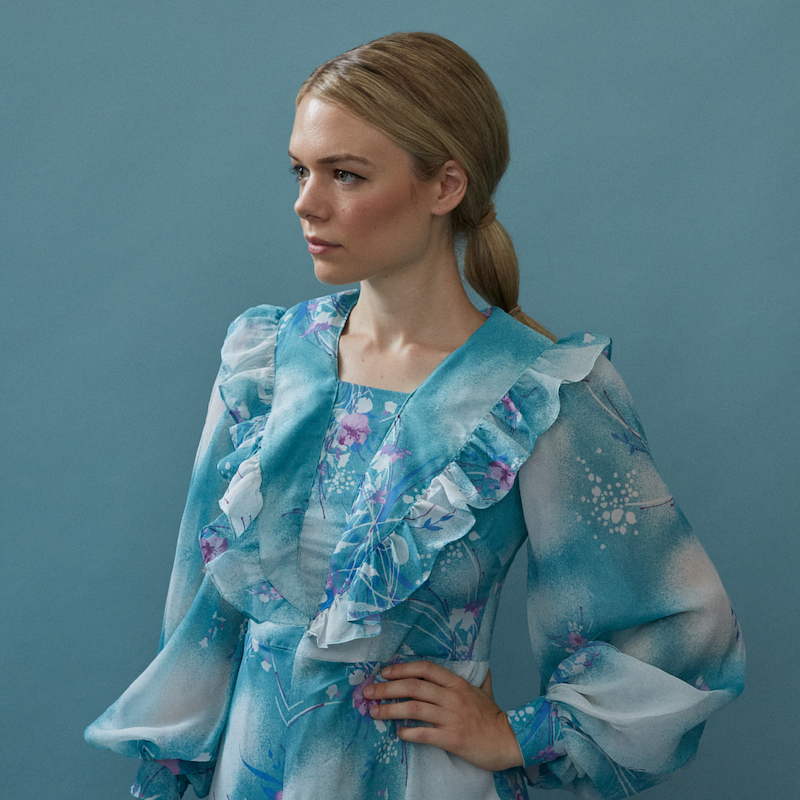
by Vanessa Valentine
Deeply felt influences, unfaltering lyricism and the hope that gets us through
Joining me, via Zoom, on a crisp morning in May, Chloe Foy and I discuss her striking new record, Where Shall We Begin. Although Foy appears cautious at first, we find familiarity in our love for Manchester and a mutual appreciation of Sharon Van Etten. The artist, she tells me, is one of the many women in music she draws inspiration from. ‘I often come up with female artists when asked about my musical influences. Bedouine, This Is The Kit, Maddison Cunningham, they’re the ones that most inspire me,’ and Foy recommends Who Are You Now – Cunningham’s 2019 debut album. ‘It’s just a classic. I’ve had it on repeat since it came out; it should be number one everywhere,’ she gushes.

Foy’s influences are perhaps most prevalent when it comes to defining her sound. Genre-bending is one of a handful of things she and Van Etten have in common. ‘I think, ultimately, my sound is grounded in the folkier side of things,’ Foy says. ‘Usually, when I write, it’s just me and an acoustic guitar. When the production comes in, that’s when it elevates. Some of my newer songs though, like Work of Art and Deserve, touch more into Americana.’
Foy goes on to share that Work of Art is her current favourite track from Where Shall We Begin. ‘It’s a bit of a new direction for me. It’s electric guitar led and has more of a four-piece-band feel to it. It’s a bit more joyful than the rest of the album, as it has a bit of hope in it.’ It’s about the energy created by music lovers when a community comes together to spend their evening lost in song. The track is a stand-out. Its steady drum beat and smooth, soothing vocals create a warmth that feels like a glimpse of sun on a dreary day.
Speaking candidly about her writing process, Foy says, ‘It tends to be about what I’m feeling and what I’m going through at that time. I’ll often just be playing the guitar and trying new things, and if I like something, I’ll just continue with that. Vocals come next and lyrically it just tends to spill out. With something like Work of Art, I came up with the chords first, then sang over it and the lyrics just kind of came.’ Foy is inspired by songwriters like Edith Piaf and Gillian Welch, so her lyricism on Where Shall We Begin is unfaltering. ‘These songs are my most inner and deepest secrets. The kind of things I only express to those closest to me, but for some reason, in song, I can be open with the world.’
The album closes the chapter on a formative period for Foy. After losing her father to depression, the singer embarked on a ten-year-period of dealing with the internal and external fallout of losing an influential figure so young. Foy reflects, ‘Where Shall We Begin touches on themes around loss and grief. I lost my father when I was fifteen and the years after that were spent coming to terms with it. Either through my own trying to piece it together and understand it, or by looking at grief through the lens of other peoples experiences. There’s also some positive messages on the album as well. My more recent songs have a bit more of a hopeful message and display a realisation that you can kind-of get through this thing called life with the support of others.’ The contrast of emotion throughout the record makes it a beautifully evocative listen. Foy’s spine chilling vocals and outstanding production come together to create a special kind of album that doesn’t come around very often.
Where Shall We Begin was recorded at Pinhole Studios in Manchester and was co-produced by Harry Fausing Smith. ‘Manchester is my home – my second home. I’ve been there for almost eight/nine years. I moved for university. I studied classical music and left a singer-songwriter,’ Foy recalls fondly, ‘There is a wonderful singer-songwriter end of the spectrum scene in Manchester that perhaps isn’t spoken about so much – I would love for it to be celebrated a bit more.’ Foy worked with various musical collaborators on the album, and the viola and harp contributions take Where Shall We Begin to a whole new level and subtly weave a classical influence into the record.
The outstanding production and Foy’s spine-chilling vocals come together to create a masterpiece, of which Asylum is another stand-out track. The gentle acoustic guitar and honeyed harmonies introduce us to a song about finding peace in the frantic world we live in. As it builds, the song starts to feel almost hymn-like. It’s perfectly crafted soundscape feels hopeful with Foy’s vocals dancing around the steadying drum beat. All of the tracks on the record are beautifully benevolent and self-compassionate. And It Goes explores how Foy’s mother’s love remained unfaltering, even as she came to terms with the loss of her soulmate. Closing track, Square Face, is a favourite of Foy’s. She teases, ‘It’s funny – we started playing Square Face when I did a strings tour; it was really good with a string trio. Loads of people were saying how much they loved the song so, yeah, that might happen in the future. A string band version of the song!’
Where Shall We Begin is an album bathed in honesty; it’s the sound of an artist stepping into their prime. Summing up the record Foy said, ‘I would hope that people come away, after listening to Where Shall We Begin, with a sense of calm, satisfaction and resolve. The album is sort of an existential crisis in a little tiny bubble. It also feels like it resolves itself in lots of ways. There are lots of questions that are answered, I hope in a very soothing way like a lullaby. I hope people come away feeling like they’ve had a nice long, warm, bath. Kind of uplifting but examining life in equal measure.’
If you’d like to support us by subscribing to our zine, click here – it’s just £6 a year for four copies (inc p&p).





